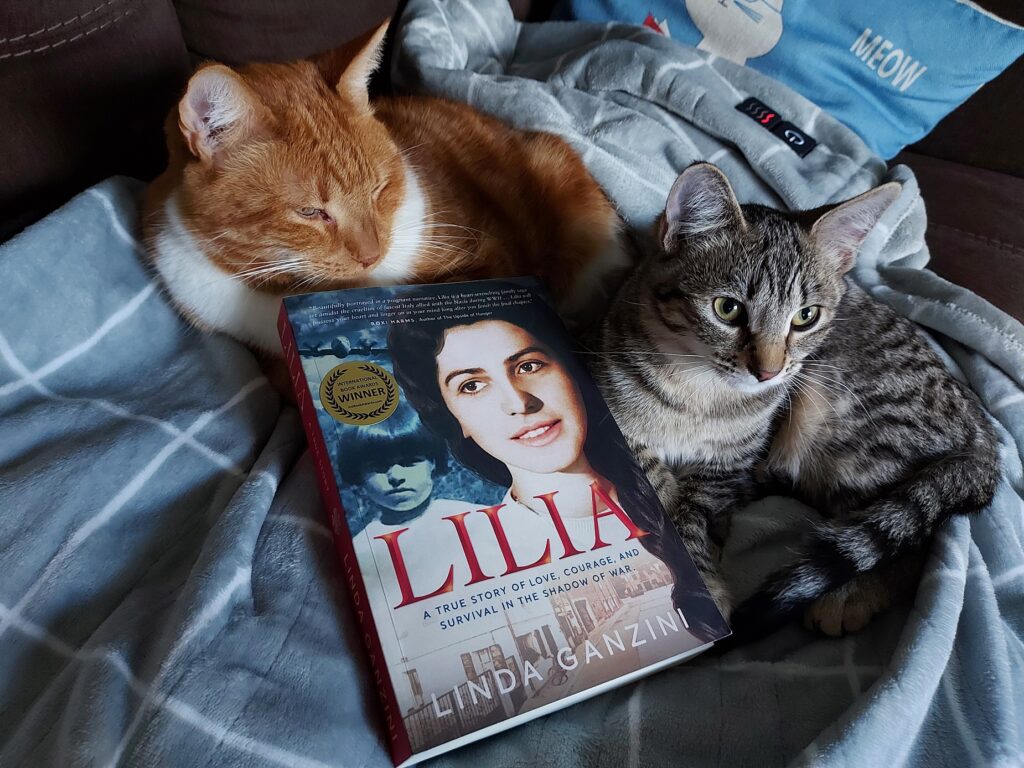Lilia by Linda Ganzini

One of the categories for the Indigo 2021 Reading Challenge is “A book by a local author”, so I went to my local independent bookstore in search for a book by a local author. It was slim pickings unless I wanted to read about the Okanagan (which I do not since I have lived here for over eighteen years). I picked out Lilia by Linda Ganzini not so much because I wanted to read another book about World War II, but because Lilia is a true story based on Ganzini’s mother’s childhood growing up in fascist, Nazi-occupied Italy during World War II. It turned out to be a very interesting and inspiring story.
Lilia is not a biography but rather a novelization of Lilia Meneguzzi’s life from 1939 to 1951. The story is told not just from Lilia’s perspective, but also that of her father and mother (Ganzini writes a love scene for her grandparents, which is…uncomfortable to think about), and even the perspective of Lilia’s oldest brother, Arturo, who was taken away from his family by the Nazis and ended up at the Flossenburg concentration camp.
Lilia was four years old when World War II began, when Italy was a fascist country under Mussolini and was allied with the Nazis. Lilia was the fifth of eight siblings. Her two older brothers, her mother’s favourite children, had compulsory military service that was only supposed to take a year, but ended up taking them far away from home. Her two older sisters were sent away to work as maids for wealthy families so that they could send money home. Lilia grew up in a small village and her family was poor. With her older siblings gone, it was up to Lilia to help take care of her three younger brothers and help her mother around the house.
Lilia is honestly a remarkable person to have had the childhood that she did and to still have hope that life will get better. It was bad enough that Lilia grew up in Nazi occupied Italy, where civilians were constantly fearful of the Nazis knocking down their doors to either send them away to a prison camp or just take them to the town square to shoot them, but Lilia also grew up essentially as a child slave that was never allowed to just be a child because her mother was a mean, miserable woman. Ganzini tries to get the reader to sympathize with her grandmother’s character, and I could sympathize with her up to a certain point, but she gave so much of her love to her two favourite children, that she comes across as not caring very much about the six other children that she had. She was so hard on Lilia and very rarely showed Lilia any kindness, when she was so lucky that Lilia loved her mother and was always eager to please her.
All the love and encouragement Lilia received in her childhood came from her father, who was as kind to his children as his wife was mean. It is too bad that he was not able to be there for a part of Lilia’s childhood. Ganzini is a bit heavy handed with the idea that love will conquer misery, tragedy, grief, etc., but it was love for her family that helped Lilia get through her despairing childhood.
Lilia ends in 1951 when Lilia was sixteen/seventeen and when she appears to first meet Linda Ganzini’s father. Lilia is the first book of what is going to be a series. I am not sure if I am interested enough in the rest of Lilia’s life to read any of the other books. Lilia is a harrowing story, not just because of the difficulties Lilia and her family faced personally, but because of the horrors of living through war and what the Nazis did to innocent people in the camps. Everyone knows what the Nazis did, books like Lilia will always be around to remind us of what they did, but when you see Holocaust deniers spewing their bullshit and fascists running around even today, it makes you wonder why some people do not see what the Nazis did as disgustingly horrifying; it makes you wonder that if torture and mass genocide in the concentration camps does not sicken everyone, then what will it take to make hate and violence stop?